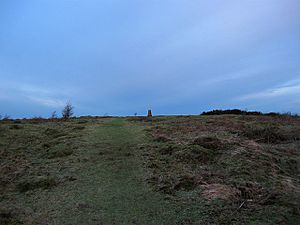Wolstonbury Hill facts for kids
| Site of Special Scientific Interest | |
 |
|
| Area of Search | West Sussex |
|---|---|
| Interest | Biological |
| Area | 58.9 hectares (146 acres) |
| Notification | 1986 |
| Location map | Magic Map |
Wolstonbury Hill is a special natural area in West Sussex, England. It covers about 58.9 hectares (146 acres) of land, which is like 145 football fields! This area is called a Site of Special Scientific Interest because it's important for its plants and animals. The National Trust looks after Wolstonbury Hill, and part of it is also a Scheduled monument, meaning it's a protected historical site.
Contents
Amazing Views from Wolstonbury Hill
Wolstonbury Hill is about 206 metres (676 ft) tall, which is like a 68-story building! It sticks out from the main South Downs hills into an area called the Weald. From the top, you can see incredible views of both the Downs and the Weald.
If you look north, you'll see wide-open views of the Weald. To the east, you can spot the Clayton Windmills and Ditchling Beacon. Hollingbury is easy to see to the southeast. Looking west, you'll see Newtimber Hill, West Hill, and the famous Devils Dyke. Even further away, you can clearly see Chanctonbury Ring.
How to Visit Wolstonbury Hill
There are no roads or car parks right at the top of Wolstonbury Hill. This means visitors need to walk or ride a mountain bike to reach the summit. It's a great place for an outdoor adventure!
The Ground Beneath Your Feet: Geology
Wolstonbury Hill is located south of the Hurstpierpoint ridge. The land around it includes a clay vale (a wide valley) that sits below the hill's steep slopes.
If you approach the hill from the north, you'll notice many linked woodlands. Some of these woods are very old! They are part of a special landscape around Danny House.
Ancient Secrets: Archeology and History
Wolstonbury Hill has a long and interesting history, with many ancient remains.
Early Settlements
One of the main features is a large enclosure from the early Bronze Age. This area, about 2.2-hectare (5.4-acre) in size, is called Wolstonbury C. There might be an even older enclosure inside it, called Wolstonbury A. It seems older because Wolstonbury C was built over it. Another possible enclosure, Wolstonbury B, might be between A and C. Experts found hints of it in a survey done in 1994. However, digs in 1995 suggest that Wolstonbury A and B might actually be old field lynchets, which are banks of earth that formed along the edges of ancient fields.
Discoveries and Damage
People started digging for flint on the hill in 1765. During these digs, skeletons were reportedly found. This digging continued until the mid-1800s and caused a lot of damage to the historical site.
In 1929, another dig uncovered many Neolithic and early Bronze Age flintwork tools. They also found "Romano-British" pottery, animal bones, and hammerstones. These finds tell us that people have been using Wolstonbury Hill for thousands of years!
 | James B. Knighten |
 | Azellia White |
 | Willa Brown |

